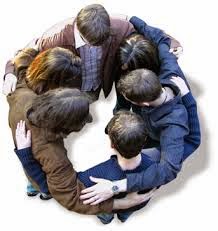The Potential for Compassionate Witnessing
One of the components of SHADE (c) is Discernment. The idea is that when a person is in the midst of a difficult situation, whether it be a conflict, a critical incident, or some hard choice to make, we need wisdom and discernment. Often it is hard to hear the "still small voice" in the midst of stress and chaos, and certainly making decisions during these same times can be next to impossible. Even if the decisions come relatively easy, there's the second guessing to deal with.
The discernment piece of SHADE involves having at least 1 or 2 others help in these moments when clarity and trust are needed, and I envision compassionate witnessing being the mode with which they do this. Compassionate witnessing flows out of restorative practices, and specifically, restorative responses to adversity and trauma. It entails two people having a facilitated conversation that is witnessed by two others. When the conversation is over, the two witnesses then talk about what they heard without judgement or evaluation. They talk of what they observed, and wonder about, and any questions they might have asked. The initial two participants listen in on this conversation. Then, once the witnesses conversation is over, the initial two talk about what they heard the witnesses say, in addition to answering the questions the witnesses had. After that cycle of conversation is complete, the 4 then have a dialogue.
The rounds of conversation are powerful because they are simply witnessed and appreciatively inquired about. This creates an atmosphere of openness and trust that lends itself to an invitational space, where the participants are permitted to listen, hear, and judge rightly what is needed. And because the witness is being focused on a singular topic, all the energy of all the wisdom in the room is at work. I'm convinced that solutions are hard to come by through brainstorming and other accepted problem solving methods because we tend to get off topic and out of focus. Distraction is the nemesis of discernment, and the place where wisdom gets lost.
I'm convinced that people in community, specifically soul care community, have all they need for life and godliness. I believe that we don't have to pay high priced professionals for help for what's ailing us, but rather, if we have 1 or 2 others in our lives who listen to us without judgement, and give a compassionate witness to our lives, we grow from strength to strength.
The discernment piece of SHADE involves having at least 1 or 2 others help in these moments when clarity and trust are needed, and I envision compassionate witnessing being the mode with which they do this. Compassionate witnessing flows out of restorative practices, and specifically, restorative responses to adversity and trauma. It entails two people having a facilitated conversation that is witnessed by two others. When the conversation is over, the two witnesses then talk about what they heard without judgement or evaluation. They talk of what they observed, and wonder about, and any questions they might have asked. The initial two participants listen in on this conversation. Then, once the witnesses conversation is over, the initial two talk about what they heard the witnesses say, in addition to answering the questions the witnesses had. After that cycle of conversation is complete, the 4 then have a dialogue.
The rounds of conversation are powerful because they are simply witnessed and appreciatively inquired about. This creates an atmosphere of openness and trust that lends itself to an invitational space, where the participants are permitted to listen, hear, and judge rightly what is needed. And because the witness is being focused on a singular topic, all the energy of all the wisdom in the room is at work. I'm convinced that solutions are hard to come by through brainstorming and other accepted problem solving methods because we tend to get off topic and out of focus. Distraction is the nemesis of discernment, and the place where wisdom gets lost.
I'm convinced that people in community, specifically soul care community, have all they need for life and godliness. I believe that we don't have to pay high priced professionals for help for what's ailing us, but rather, if we have 1 or 2 others in our lives who listen to us without judgement, and give a compassionate witness to our lives, we grow from strength to strength.


Comments
Post a Comment